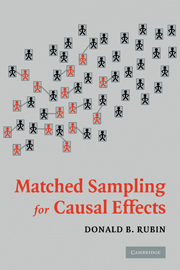Book contents
- Frontmatter
- Contents
- Contributor Acknowledgments
- Matched Sampling for Causal Effects
- My Introduction to Matched Sampling
- PART I THE EARLY YEARS AND THE INFLUENCE OF WILLIAM G. COCHRAN
- PART II UNIVARIATE MATCHING METHODS AND THE DANGERS OF REGRESSION ADJUSTMENT
- PART III BASIC THEORY OF MULTIVARIATE MATCHING
- PART IV FUNDAMENTALS OF PROPENSITY SCORE MATCHING
- PART V AFFINELY INVARIANT MATCHING METHODS WITH ELLIPSOIDALLY SYMMETRIC DISTRIBUTIONS, THEORY AND METHODOLOGY
- PART VI SOME APPLIED CONTRIBUTIONS
- PART VII SOME FOCUSED APPLICATIONS
- Conclusion: Advice to the Investigator
- References
- Author Index
- Subject Index
PART VI - SOME APPLIED CONTRIBUTIONS
Published online by Cambridge University Press: 05 June 2012
- Frontmatter
- Contents
- Contributor Acknowledgments
- Matched Sampling for Causal Effects
- My Introduction to Matched Sampling
- PART I THE EARLY YEARS AND THE INFLUENCE OF WILLIAM G. COCHRAN
- PART II UNIVARIATE MATCHING METHODS AND THE DANGERS OF REGRESSION ADJUSTMENT
- PART III BASIC THEORY OF MULTIVARIATE MATCHING
- PART IV FUNDAMENTALS OF PROPENSITY SCORE MATCHING
- PART V AFFINELY INVARIANT MATCHING METHODS WITH ELLIPSOIDALLY SYMMETRIC DISTRIBUTIONS, THEORY AND METHODOLOGY
- PART VI SOME APPLIED CONTRIBUTIONS
- PART VII SOME FOCUSED APPLICATIONS
- Conclusion: Advice to the Investigator
- References
- Author Index
- Subject Index
Summary
Each of the chapters in Part VI has a real application as its focus, but each one also includes some new methodological contribution. This is in some contrast to the chapters in Part VII, where the focus is almost entirely on the application and/or providing some general advice based on work done in other articles.
Chapter 19, Holland and Rubin (1988), consider case-control or retrospective studies (e.g., see Breslow and Day, 1980). Such studies, which are often used to investigate rare diseases, do not match treated and control subjects, as with all the methods we have studied here that generate the “prospective” study. Rather, the pair-matched retrospective study matches cases (e.g., infected with a particular disease) to controls (free of that disease) on the basis of background variables. Although this is a very helpful design when searching for possible causes of a disease, such matching is inherently “backward” and is fully correct only under the null hypothesis of no effect of treatment on the disease. Retrospective matching of cases and controls, therefore, does not generally control for the background variables used to create the matches – additional stratification or model-based adjustment is still needed. This fact is pointed out in the article, which also illustrates the point using data from a case-control study of the effect of coffee drinking on myocardial infarction.
This conclusion was previously known but not stated within the context of the “Rubin Causal Model” using potential outcomes and an assignment mechanism.
Information
- Type
- Chapter
- Information
- Matched Sampling for Causal Effects , pp. 305 - 307Publisher: Cambridge University PressPrint publication year: 2006
